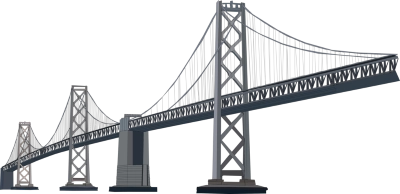ความหมายของคำ bridge ในภาษาไทย
bridge ในภาษาอังกฤษหมายถึงอะไร? มาร่วมค้นหาความหมาย การออกเสียง และวิธีใช้คำนี้อย่างละเอียดกับ Lingoland
bridge
US /brɪdʒ/
UK /brɪdʒ/

คำนาม
1.
สะพาน
a structure carrying a road, path, railway, or canal across a river, ravine, road, railway, or other obstacle
ตัวอย่าง:
•
The old stone bridge crosses the river.
สะพานหินเก่าข้ามแม่น้ำ
•
They built a new bridge to connect the two islands.
พวกเขาสร้างสะพานใหม่เพื่อเชื่อมสองเกาะ
2.
สันจมูก
the upper bony part of the nose
ตัวอย่าง:
•
She wears her glasses on the bridge of her nose.
เธอสวมแว่นตาบนสันจมูก
•
He broke the bridge of his nose in the accident.
เขาหักสันจมูกในอุบัติเหตุ
3.
สะพานเชื่อม, การเชื่อมโยง
a connecting or transitional passage or link
ตัวอย่าง:
•
The program aims to bridge the gap between theory and practice.
โครงการนี้มีเป้าหมายเพื่อเชื่อมช่องว่างระหว่างทฤษฎีและการปฏิบัติ
•
Music can act as a bridge between different cultures.
ดนตรีสามารถทำหน้าที่เป็นสะพานเชื่อมระหว่างวัฒนธรรมที่แตกต่างกันได้
คำพ้องความหมาย:
กริยา
1.
สร้างสะพาน, เชื่อมต่อ
to make a bridge over (something)
ตัวอย่าง:
•
They plan to bridge the river with a new structure.
พวกเขาวางแผนที่จะสร้างสะพานข้ามแม่น้ำด้วยโครงสร้างใหม่
•
The engineers will bridge the gap between the two cliffs.
วิศวกรจะเชื่อมช่องว่างระหว่างหน้าผาสองแห่ง
2.
เชื่อมช่องว่าง, ลดความแตกต่าง
to reduce or get rid of the difference between two things or groups of things
ตัวอย่าง:
•
The new policy aims to bridge the economic divide.
นโยบายใหม่มีเป้าหมายเพื่อเชื่อมช่องว่างทางเศรษฐกิจ
•
Her research helped to bridge the gap between different scientific fields.
งานวิจัยของเธอช่วยเชื่อมช่องว่างระหว่างสาขาวิทยาศาสตร์ที่แตกต่างกัน